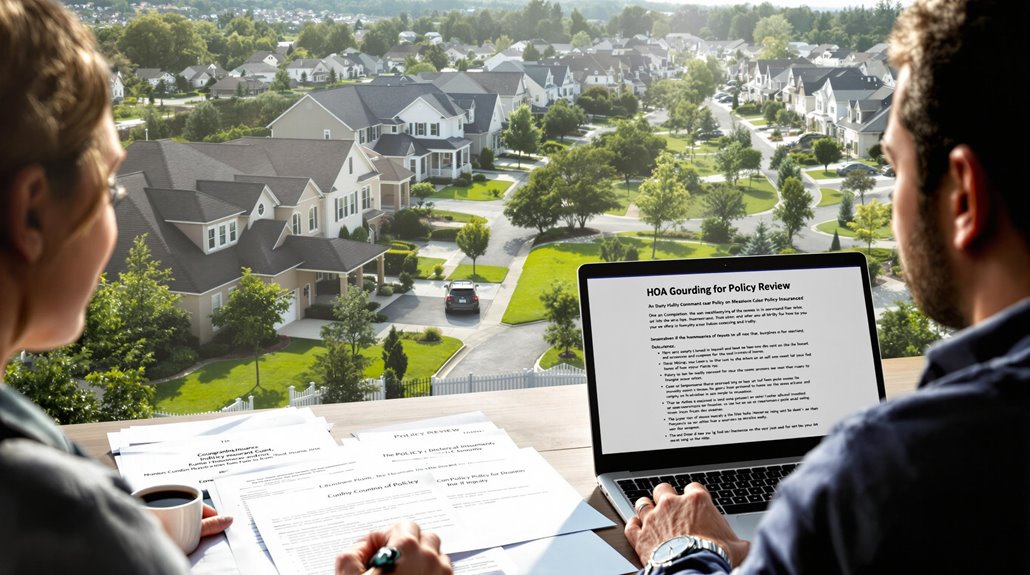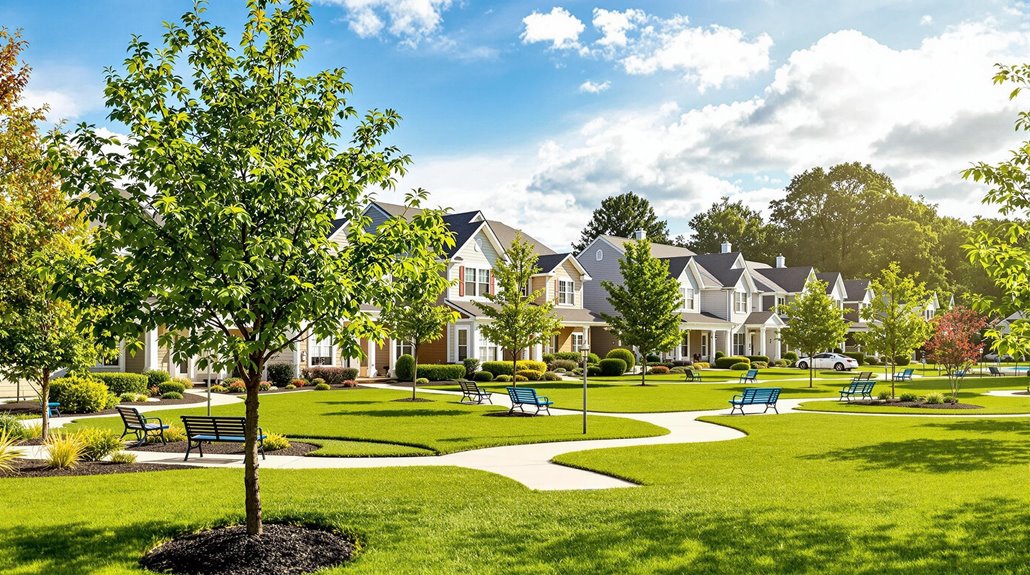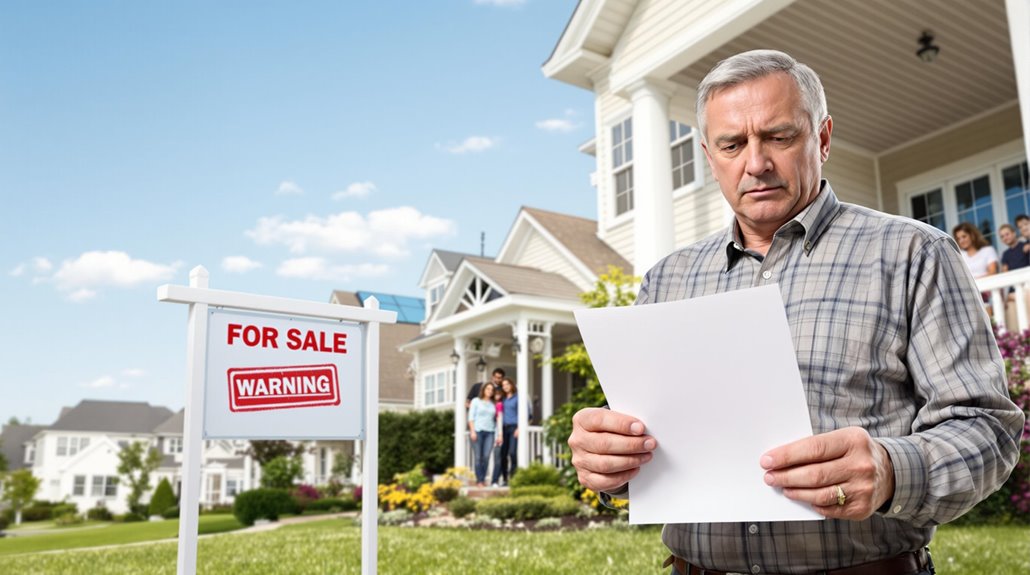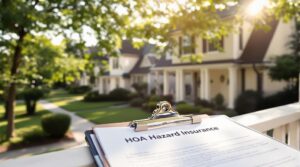Homeowners Associations (HOAs) have the legal authority to require homeowners insurance through state laws and governing documents like bylaws and CC&Rs. Non-compliance can result in monetary penalties, restricted access to amenities, or even foreclosure proceedings. HOAs establish minimum coverage thresholds for both property and liability protection to safeguard individual and community interests. Property owners must verify their coverage meets HOA standards and maintain proper documentation. Understanding the specific requirements and consequences helps protect homeowners’ investments.
Key Takeaways
- HOAs have legal authority through state laws and governing documents to require homeowners insurance from their members.
- Required coverage typically includes liability protection and specific minimum coverage thresholds established by the HOA.
- Non-compliance with HOA insurance requirements can result in fines, restricted amenity access, and potential foreclosure proceedings.
- Homeowners must review governing documents carefully to understand specific insurance requirements and maintain proper documentation.
- HOAs mandate insurance to protect both individual property owners and the collective interests of the community.
Legal Authority of HOAs to Mandate Insurance
While HOAs derive their authority from state laws and governing documents, their legal right to mandate homeowners insurance stems primarily from the association’s bylaws and CC&Rs. These governing documents establish the foundation for insurance requirements and outline specific coverage mandates that property owners must maintain.
Homeowners associations exercise their legal authority through clearly documented insurance provisions that protect both individual homeowners and the community’s collective interests. The enforcement of these requirements typically involves regular verification of insurance coverage and implementation of compliance measures.
When homeowners fail to maintain required insurance policies, HOAs may impose penalties or pursue legal remedies as specified in their governing documents.
The extent of an HOA’s legal authority to mandate insurance coverage can vary by jurisdiction, making it essential for associations to guarantee their requirements align with applicable state and local regulations while maintaining clear documentation of all insurance-related provisions.
Understanding Your HOA’s Insurance Requirements

Given the legal framework that empowers HOAs to mandate insurance coverage, homeowners must thoroughly review and comprehend their association’s specific insurance requirements.
HOA insurance typically encompasses detailed provisions outlined in the association’s governing documents, which individual homeowners are obligated to follow.
To maintain compliance, homeowners must carefully examine their HOA’s bylaws and declarations regarding insurance coverage. These documents specify the types and levels of coverage required, and homeowners pay particular attention to meeting these standards to avoid potential penalties.
Regular policy reviews guarantee continued adherence to the association’s requirements, as coverage needs may change over time.
Understanding state-specific regulations is equally vital, as these laws can affect how insurance requirements are enforced.
Homeowners should maintain proper documentation of their coverage and promptly respond to any HOA requests for proof of insurance to prevent potential legal complications or violations of association rules.
Key Components of Required Coverage

Essential components of HOA-mandated homeowners insurance typically encompass multiple coverage categories designed to protect both individual property owners and the broader community.
A thorough home insurance policy meeting HOA requirements must include specific liability protection measures, particularly for incidents occurring in common areas.
Homeowners associations establish minimum coverage thresholds that property owners must maintain to remain compliant with governing documents. These coverage requirements often focus on protecting the community from potential legal exposures and financial risks.
The HOA insurance policy mandates typically specify the extent of liability coverage needed, which homeowners must verify through their individual policies.
Property owners bear the responsibility of reviewing their coverage details to confirm alignment with association standards.
Failure to maintain adequate insurance coverage according to HOA specifications may result in violations and subsequent enforcement actions, highlighting the importance of understanding and adhering to these requirements.
Consequences of Non-Compliance With Insurance Rules

Property owners who fail to comply with HOA insurance requirements face serious consequences that can escalate from monetary penalties to potential property loss.
When homeowners neglect to maintain proper coverage, HOAs typically respond with fines or restrictions on property use and community amenities.
Non-compliance greatly increases liability exposure for homeowners, as their personal assets become vulnerable without adequate insurance protection.
The HOA community may pursue legal actions to recover damages resulting from incidents involving common areas where required coverage was absent. These actions can include lawsuits and additional financial penalties.
Persistent violations of insurance requirements can lead to more severe consequences.
HOAs may initiate foreclosure proceedings if homeowners fail to address accumulated fines and fees related to their non-compliance.
This measure serves as a last resort to protect the community’s interests and guarantee all property owners maintain appropriate insurance coverage as mandated by governing documents.
Steps to Meet HOA Insurance Standards

To avoid facing the serious consequences of non-compliance, homeowners must take specific steps to meet their HOA’s insurance standards. The first essential action is conducting a thorough review of the association’s governing documents to understand specific coverage limits and requirements that complement the HOA master policy.
Homeowners should maintain accurate records of their personal condo insurance and submit proof of coverage within designated deadlines. Regular policy evaluations guarantee continued compliance with minimum requirements, particularly regarding liability for injuries that may occur in common areas.
When insurance requirements change through amendments to HOA documents, homeowners should promptly consult with their insurance providers to adjust coverage accordingly.
For clarity on specific requirements, homeowners can request guidance from the HOA board or management company. This proactive approach helps maintain adequate protection while guaranteeing full compliance with association standards and preventing potential coverage gaps or violations.
The Benefits Of Consulting A Public Adjuster

Public adjusters provide homeowners with professional expertise in managing complex insurance claims while conducting thorough, objective assessments of property damage.
Their involvement typically streamlines the claims process through detailed documentation, policy interpretation, and skilled negotiation with insurance carriers.
Studies indicate that policyholders who engage public adjusters often secure notably higher settlement amounts, with potential increases of up to 800% compared to unrepresented claims.
Expertise In Insurance Claims
When homeowners face complex insurance claims, consulting a public adjuster can markedly enhance their likelihood of receiving fair compensation for property damages.
These licensed professionals possess specialized knowledge in homeowners insurance and liability claims, enabling them to effectively evaluate damages and interpret policy details.
Public adjusters serve as advocates who manage communications with the insurance company while guaranteeing personal protection through thorough claim documentation.
Their expertise extends to understanding coverage limitations, policy exclusions, and proper valuation of damages.
Working on a contingency fee basis, they are incentivized to maximize insurance coverage for their clients.
This arrangement guarantees their interests align with the policyholder’s goals, particularly in situations involving extensive property damage or disputed claims that require detailed documentation and skilled negotiation.
Objective Damage Assessment
One of the most vital advantages of engaging a public adjuster lies in their ability to provide impartial, thorough damage assessments following property incidents. Their expertise guarantees accurate evaluation of personal property damages, which is significant when dealing with coverage your HOA may require.
Public adjusters offer extensive documentation and professional evaluation services, typically charging 5-15% of the claim amount. This investment often yields higher settlements that provide enhanced financial protection for homeowners.
Their knowledge of local building codes and insurance regulations strengthens their ability to handle damage or liability claims effectively. By managing communications with insurance companies and providing expert documentation, public adjusters streamline the claims process, enabling homeowners to secure appropriate compensation while maintaining compliance with their insurance protects requirements.
Streamlined Claim Process
Building upon the foundational assessment of property damage, the streamlined claims process offered by professional public adjusters represents a significant advantage for homeowners seeking expedited resolution.
Their expertise in personal insurance matters guarantees thorough policy interpretation and maximum protection for property owners.
Public adjusters facilitate efficient claims management by guiding complex coverage requirements, whether for individual homes or units within a condo association.
Their specialized knowledge helps identify all applicable coverage options while managing documentation and negotiations with insurance carriers.
This professional representation often results in higher claim settlements and reduced processing time.
The adjuster’s ability to interpret policy details and advocate for the homeowner’s interests creates a more structured and effective claims experience, minimizing potential coverage gaps and guaranteeing appropriate compensation for damages.
Higher Claim Payouts & Settlements
Through thorough analysis and strategic negotiation, public adjusters consistently secure higher claim settlements for homeowners compared to self-managed insurance claims.
Studies indicate that individual policyholders who engage public adjusters typically receive 20-50% higher claim payouts than those who handle claims independently.
Public adjusters leverage their extensive knowledge of insurance policies to identify coverage opportunities and damages that homeowners might overlook.
Operating on a contingency fee basis guarantees their interests align with maximizing the settlement amount.
Their expertise helps determine precisely what the policy will cover, leading to more complete homeowners insurance claims.
Additionally, they manage the complex claims process, allowing property owners to focus on recovery while professionals handle insurer negotiations, documentation, and damage assessment procedures.
About The Public Claims Adjusters Network (PCAN)

Insurance policyholders seeking expert assistance with property damage claims can turn to the Public Claims Adjusters Network (PCAN), a nationwide organization of pre-vetted, state-licensed public adjusters.
PCAN serves as an essential resource connecting property owners with qualified professionals who specialize in handling residential and commercial insurance claims. These experts assist with maneuvering complex homeowners or condo insurance matters, often coordinating with management companies to guarantee proper coverage under both individual and master policy requirements.
PCAN members undergo rigorous vetting and must maintain the highest professional standards, including annual license audits and complaint reviews.
The network’s adjusters handle over 30 different claim types across 40+ states, providing expertise in various aspects of property damage and liability claims. Their intensive admission process and ongoing oversight assure that only top-performing adjusters maintain membership, offering policyholders access to industry-leading claims professionals.








